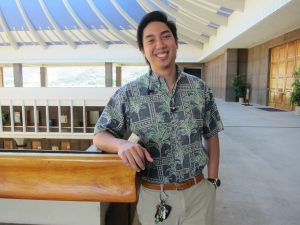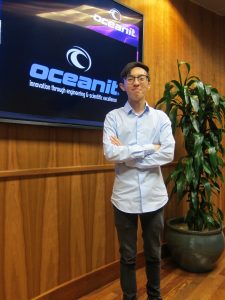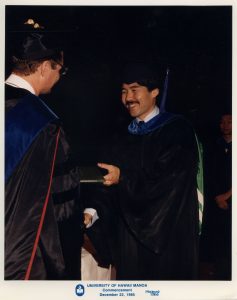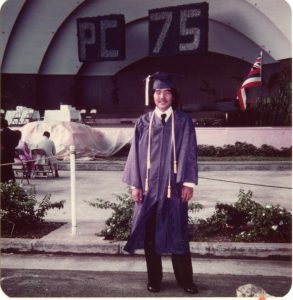Public schools, UH and local talent fuel the state’s future
Posted on Mar 29, 2018 in FeaturedIf you’re feeling cynical about Hawai‘i’s future, here’s an antidote: Spend some time with a couple of young people like Renzee Reyes and Christopher Nguyen — two proud public school and University of Hawai‘i graduates who, like others, have found a way to carve out 21st century careers and build impressive resumes. Both majored in computer science at UH Mānoa and praised the education they received there to prepare them for “real-world” jobs. Both credit the teachers they had in high school — Renzee at Mililani and Christopher at Farrington — for setting them on a path to success. What stands out is how each found ways to combine a love for the islands with job opportunities to benefit the people of our state.
RENZEE REYES
When Governor Ige talks about creating Hawai‘i tech jobs for the next generation, he has in mind young people like Renzee Reyes. After graduating from UH two years ago with his computer science degree, Reyes, 25, could have gone anywhere. “The mainland was an option, but I knew I wanted to start my career in Hawai‘i,” he said, “and work toward an advanced degree.”
That’s when he found a 21st century solution. As a data analyst for MDX Hawai‘i, a local health care company, Reyes has the best of several worlds. He’s applying his tech expertise to the high-demand field of health care in Hawai‘i while pursuing a master’s in data science online from UC Berkeley. He’s even able to work remotely from his home on O‘ahu’s west side.
“MDX has been really good about letting me flex some hours while I pursue my master’s,” Reyes said. “My job involves developing software, data analysis and doing what I learned at UH. I’m also able to apply what I’m studying for my master’s to real-world issues. It’s a powerful combination.”
Reyes said at Mililani High he chose a career pathway that mixed computer skills with the creative process. Now at MDX, he said, “I get to work on both the technical and design sides.” It’s this creative and critical thinking process, not just punching numbers, that Reyes sees as the promise of STEM. “Coding breaks something down into logical steps to achieve a goal. That kind of skill applies everywhere,” he said. “I hope we can do more to connect UH grads to careers in Hawai‘i.”
CHRISTOPHER NGUYEN
Christopher Nguyen, 21, admits being raised in public housing could have led him down the wrong path. That it didn’t is a tribute to his immigrant parents, his own determination and the teachers who helped him excel in STEM fields.
“My parents really believed that education is opportunity so I never let myself be defined by “at risk” stereotypes,” he said. “I had big dreams and wanted to create my own future.” To read his resume, that would be an understatement. Nguyen said his high school robotics, science fair and other STEM activities helped him win enough scholarships to cover his college education.
He said he was accepted for admission to the University of Southern California, but his dad was diagnosed with cancer so he decided to attend UH Mānoa instead. But far from being a consolation prize, Nguyen parlayed his UH home base into a launching pad for internships locally and on the mainland.
His resume includes three internships at Oceanit, a Hawai‘i-based global engineering and innovation company; a summer IBM internship in California; and a NASA Space Grant fellowship to research ‘cold traps” on the moon. His UH team also took first place at the Governor’s 2017 Code Challenge for creating an app and map to pinpoint UH Mānoa campus locations.
After Nguyen graduates this spring, he’s looking forward to working at a large tech company, then coming back to the islands to teach. As for encouraging other students, he advised, “You can create your own future. No matter where you start in life, you can make success happen if you’re motivated enough.”
Another local boy’s story . . . “Education is the key to a better life” was the message Governor Ige and his five brothers heard from his parents. His dad’s formal education stopped
at the 8th grade on Ewa Plantation; Tokio Ige expected his sons to aim higher. The governor was prime college material: president of his senior class and a student body vice president. But as the fifth of six sons, the governor was worried about costs. Two of his brothers had already gone to mainland schools, and his younger brother was thinking about college, too. When the governor received his acceptance to the Massachusetts Institute of Technology — one of the most prestigious schools in the country — he didn’t tell his parents. “I knew they would have sacrificed to send me there, but it would have been a huge burden.” So the governor chose the University of Hawai‘i for his engineering degree and master’s in business administration. “I’ve always felt that going to a more ‘prestigious’ school doesn’t make you a better person,” he said. “Making the most of your opportunities determines the quality of your education.”
After graduation, the governor said he received 41 job offers — 40 from the mainland and only one from Hawai’i. “I want to make sure that future students have more career choices here,” he said.
Read more in April Capitol Connection newsletter



